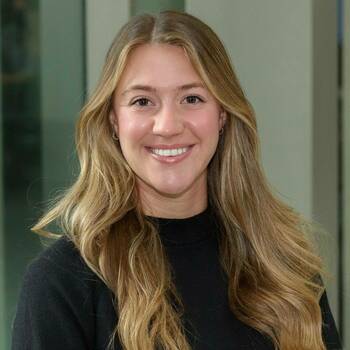Miranda Rogliano is a 2019 alumna of the Eck Institute for Global Health's Master of Science in Global Health program. She previously earned her BA degree from Elon University, where she majored in Public Health Studies & Psychology. In this spotlight, Miranda shares her international research experiences, her passion for global health, and details about her current position at American Society of Tropical Medicine and Hygiene (ASTMH).

Q. Tell us about how and when you first became interested in global health. How would you describe your global health passions?
A. I first became interested in global health during a trip to Peru. I was originally there to experience the cultural aspects of the country and dive deeper into the Spanish language, but along the way, I realized I was noticing the health disparities more than anything else. After my experience in Peru, I was fortunate to travel around Europe studying the various health systems, which solidified my enthusiasm for global health.
My global health passions are ever-evolving. However, I would say my vested interest in low- and middle-income countries (LMICs) is a common thread.
Q. What are you doing now professionally/academically?
A. Currently, I work at the American Society of Tropical Medicine and Hygiene (ASTMH). Thanks to the Master of Science in Global Health (MSGH) program director at the time, Dr. Katherine Taylor, I was introduced to ASTMH after graduation and it was a great fit. ASTMH is the largest international scientific organization of experts dedicated to reducing the worldwide burden of tropical infectious diseases and improving global health. Each year, the Society hosts an Annual Meeting as a forum for sharing the latest in tropical medicine and global health research. This year’s meeting held on October 30 - November 3, was the first in-person meeting since 2019, and we hosted over 4,000 attendees and around 150 sessions.
Q. What is your most memorable experience at Notre Dame and why?
A. Each student in the MSGH program completed a Capstone Field Research project. Since I matriculated at the Eck Institute for Global Health before COVID-19, my cohort traveled internationally to complete their research. One of the most memorable experiences I had at Notre Dame was returning from abroad and exchanging stories with my classmates from our time all over the world — fishing boats in The Gambia, mosquitos in Ecuador, Eid al-Fitr in Bangladesh, street markets in Uganda, monsoons in Malaysia. Most of all, I remember the heartfelt connections many of us made with our research collaborators and participants while completing research internationally.
Q. How did your time with the Eck Institute for Global Health and Master of Science in Global Health program change you or your perspectives?
A. While lectures and textbooks are important pieces of education, life in an LMIC is not something you can learn in a classroom. During my time in the MSGH program, I had my first true experience living in a low-income country. My time in The Gambia not only influenced my research and career perspectives but my own personal ethos. I will always cherish my Gambian experience and will continue to live out my belief that health is a human right.
Q. Do you have any plans for the future? If so, what are they?
A. One of my favorite things about working in global health is that career journeys are often circuitous. Over the course of my own career, I’d like to explore different global health spaces and find the fit that’s best for me. Regardless of where my work takes me – research or implementation, advocacy or consulting – I know that I will be lucky to have a passion for my profession.
Q. Can you tell us a fun fact about yourself, or something you enjoy doing in your free time?
A. I have always spent a lot of time at the Jersey shore during the summer. I absolutely love being on the water and even have a boating license! Our neighborhood is a community of waterfront homes and you can access each house through interconnected canals. Growing up, we would swim, paddleboard, or kayak to our friends’ houses.